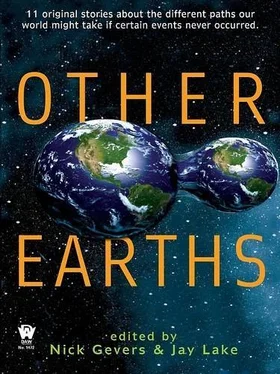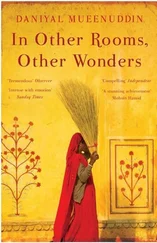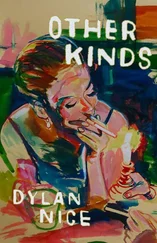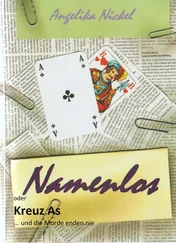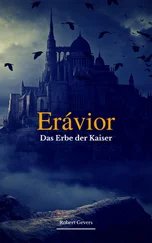Nick Gevers - Other Earths
Здесь есть возможность читать онлайн «Nick Gevers - Other Earths» весь текст электронной книги совершенно бесплатно (целиком полную версию без сокращений). В некоторых случаях можно слушать аудио, скачать через торрент в формате fb2 и присутствует краткое содержание. Жанр: Фантастика и фэнтези, на английском языке. Описание произведения, (предисловие) а так же отзывы посетителей доступны на портале библиотеки ЛибКат.
- Название:Other Earths
- Автор:
- Жанр:
- Год:неизвестен
- ISBN:нет данных
- Рейтинг книги:3 / 5. Голосов: 1
-
Избранное:Добавить в избранное
- Отзывы:
-
Ваша оценка:
- 60
- 1
- 2
- 3
- 4
- 5
Other Earths: краткое содержание, описание и аннотация
Предлагаем к чтению аннотацию, описание, краткое содержание или предисловие (зависит от того, что написал сам автор книги «Other Earths»). Если вы не нашли необходимую информацию о книге — напишите в комментариях, мы постараемся отыскать её.
Other Earths — читать онлайн бесплатно полную книгу (весь текст) целиком
Ниже представлен текст книги, разбитый по страницам. Система сохранения места последней прочитанной страницы, позволяет с удобством читать онлайн бесплатно книгу «Other Earths», без необходимости каждый раз заново искать на чём Вы остановились. Поставьте закладку, и сможете в любой момент перейти на страницу, на которой закончили чтение.
Интервал:
Закладка:
I had the book copied and bound and FedExed the copy to my agent. The cover letter explained how I had obtained it and asked him to find out whatever he could. He called two mornings later to congratulate me on a stroke of marketing genius, saying that The Tea Forest could be another Blair Witch and that this hoax concerning a second Thomas Cradle was a brilliant way of preparing the market for the debut of my “new” style. When I told him it wasn’t a hoax, as far as I knew, he said not to worry, he’d never tell, and declared that if Random House wouldn’t go for the book, he’d take me over to Knopf. At this juncture, I began to acknowledge that the universe might be as Cradle Two described, and, since there would be no one around to charge me with plagiarism, I saw no reason not to profit from the book; but I told him to hold off on doing anything, that I needed to think it through and, before all else, I might be traveling to Cambodia and Vietnam.
The idea for the trip was little more than a whim, inspired by my envy of Cradle Two and the lush deviance of his life, as evidenced by The Tea Forest ; but over the ensuing two months, as I reread sections of the novel, committing many of them to memory, the richness of the prose infected me with Cradle Two’s obsessiveness (which, after all, was a cousin to my own), and I came to speculate that if I retraced his steps (even if they were steps taken in another universe), I might derive some vital benefit. There was a mystery here that wanted unraveling, and there was no one more qualified than I to investigate it. While I hadn’t entirely accepted his rice paper model of the universe, I believed that if his analogy held water, I might be able to perceive its operations more clearly through the simple lens of a river culture. However, one portion of the novel gave me reason for concern. The narrator, TC, had learned during the course of his journey that in one alternate universe he was a secretive figure of immense power, evil in nature, and that his innumerable analogs were, to some degree or another, men of debased character. The final section of the book suggested that he had undergone a radical transformation, and that idea was supported by a transformation in the prose. Under other circumstances, I would have perceived this to be a typical genre resolution, but Cradle Two’s sentences uncoiled like vipers waking under the reader’s eye, spitting out a black stream of venom from which the next serpent would slither, dark and supple, sleekly malformed, governed by an insidious sonority that got into my head and stained my dreams and my work for days thereafter. Eventually I convinced myself that Cradle Two’s gift alone was responsible for this dubious magic and that it had been done for dramatic effect and was in no way a reflection of reality.
The book, the actual object, became an article of my obsession. I liked touching it. The slickness of the cover; the tacky spot on the back where a clerk or prior owner had spilled something sticky or parked a wad of chewing gum; the neat yet uninspired marginalia; the handwritten inscription, “To Tracy,” and the anonymity of the dedication, “For you”; the faintly yellowed paper; the tear on page 19. All its mundane imperfections seemed proofs of its otherworldliness, that another world existed beyond the enclosure of my own, and I began carrying the book with me wherever I went, treating it as though it were a lover, fondling it, riffling its pages, fingering it while I drove, thinking about it to the point of distraction, until the idea of the trip evolved from a whim into a project I seriously considered, and then into something more. Though was ordinarily a cynical type, dismissive of any opinion arguing the thesis that life was anything other than a cruel and random process, my affair with the book persuaded me that destiny had taken a hand in my life, and I would be a fool not to heed it (I think every cynic’s brassbound principles can be as easily overthrown). And so, tentatively to begin with, yet with growing enthusiasm, I started to make plans. As a writer, I delighted in planning, in charting the course of a story, in assembling the elements of a fiction into a schematic, and I plotted the trip as though it were a novel that hewed to (but was not limited by) the picaresque flow of Cradle Two’s voyage along the Mekong. There would be a woman, of course—perhaps two or three women—and here a dash of adventure, here a time for rest and reflection, here the opportunity for misadventure, here a chance for love, and here a chance for disappointment. I laid in detail with the care of a master craftsman attempting a delicate mosaic, leaving only one portion undone: the ending. That would be produced by the alchemy of the writing or, in this instance, the traveling.
I intended to hew closely in spirit to the debauched tenor of Cradle Two/TC’s journey, and I hoped that by setting up similar conditions, I might have illuminations similar to his; but I saw no purpose in duplicating its every detail—I expected my journey to be a conflation of his experience. The lion’s share of his troubles on the trip had stemmed from his choice of boats, so rather than buying a leaky fishing craft with an unreliable engine for cheap, I arranged to have a houseboat built in Stung Treng. The cost was negligible, four thousand dollars, half up front, for a shallow-draft boat capable of sleeping four with a fully equipped galley and a new engine. Once I completed the trip, I intended to donate it to charity, a Christian act that, given the boat’s value in U.S. dollars, would allow me to take a tax write-off of several times that amount. I informed Kim that I’d be going away for six to eight weeks, roughing it (she considered any activity that occurred partially outdoors to be roughing it) on the Mekong, far from five-star hotels and haute cuisine, and that she was welcome to hook up with me in Saigon, where suitable amenities were available. However, I cautioned her that I would be attempting to recreate the mood described in The Tea Forest , and this meant I would be seeing other women. Perhaps, I suggested, she should seize the opportunity to spread her wings.
Kim, a tall, striking brunette, had an excellent mind, a background in microbiology, and a scientist’s dispassionate view of human interactions. We had discussed marriage and discussed rather more the possibility of having children, but until we reached that pass, she was comfortable with maintaining an open relationship. She told me to be careful, a reference both to safe sex and to the problems I’d had in compartmentalizing my emotional life, and gave me her blessing. I then contacted my agent and instructed him to sell The Tea Forest while I was gone. These formalities out of the way, I had little left to do except lose some weight for the trip and cultivate a beard—I thought this would help get me into character—and wait for the end of the fall monsoon.
I flew to Bangkok and there took passage on the Ubon Ratchatani Express toward the Lao border, berthed in an old-fashioned sleeping car with curtained fold-down beds on both sides of the aisle. I spent a goodly portion of the evening in the bar car, which reeked of garlic and chilis and frying basil, drinking bad Thai beer, trying to acclimate myself to the heat that poured through the lowered windows. From Ubon, I traveled by bus to Stung Treng, a dismal town of about twenty-five thousand at the confluence of the Mekong, the Sesan, and the Sekong Rivers. It was a transit point for backpackers, a steady trickle of them, the majority remaining in town no more than a couple of hours, the length of time it took for the next river taxi to arrive. I had thought to pick up a companion in one of the larger Cambodian towns downriver, but as I would be trapped in Stung Treng for three days while the boat was being fitted and provisioned, I posted signs at the border, in the open-air market, and around town, advertising a cruise aboard the Undine (the name of my houseboat) in exchange for personal services. Women only. See the bartender at the Sekong Hotel.
Читать дальшеИнтервал:
Закладка:
Похожие книги на «Other Earths»
Представляем Вашему вниманию похожие книги на «Other Earths» списком для выбора. Мы отобрали схожую по названию и смыслу литературу в надежде предоставить читателям больше вариантов отыскать новые, интересные, ещё непрочитанные произведения.
Обсуждение, отзывы о книге «Other Earths» и просто собственные мнения читателей. Оставьте ваши комментарии, напишите, что Вы думаете о произведении, его смысле или главных героях. Укажите что конкретно понравилось, а что нет, и почему Вы так считаете.
